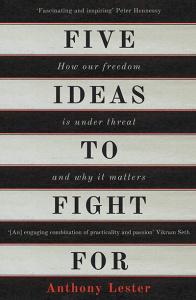Five Ideas to Fight For
 By Anthony Lester
By Anthony Lester
Review by Hajar (Law)
Many including myself were inspired to study Law because of a desire to pursue justice. As a teenager, it was this desire that made me particularly attached to the language and notion of human rights. Thomas Paine, one of the earliest scholars in this field, lamented in The Rights of Man about Edmund Burke’s disdain for prisoners in the Bastille, who “lingered out the most wretched of lives” in the “most miserable of prisons”. The success of The Rights of Man, and similarly the modern success of the language of human rights, are linked to this kind of sentimentality — the compassion for various human sufferings, and the belief that we have the natural right to rise above them, that this is true justice.
But as I soon discovered, justice is never clear-cut, not even in the human rights paradigm. Enter Five Ideas to Fight For, whose late author, Lord Anthony Lester QC, was a ground-breaking human rights barrister and advocate. When I first read the book, a lot of the subject-matter was unfamiliar. A lot of Googling ensued “Human Rights Act UK?”, “UK unwritten constitution?”, “Commonwealth countries freedom of speech?”, “Gender pay gap?” and “Racial discrimination US UK?”
I was determined to understand everything (impossible). Lord Lester was clearly an expert. He was at the core of the development of the Human Rights Act, the Equality Act and much other parliamentary and judicial law-making. The book is concise and fast-paced, jam-packed with his valuable experience and insight as a barrister and a member of the House of Lords.
Looking back, it’s enough to understand his message, which above all is the championing of human rights. He acknowledges that the primacy of human rights is not always clear-cut, sometimes they are in conflict and a balancing act is needed. Sometimes their language is politically charged. These “weaknesses”, so to speak, were news to me, who up until then saw human rights as something non-negotiable and inalienable.
Reading this book taught me to begin thinking in a more nuanced manner. I think now that it’s okay, and in many cases good, to be sentimental about human rights, to weaponize their language, even, for much-required political change so long as you are aware of the conflicts and discussion at their core. But, Lord Lester seems to say, what good comes of discussion? He dispenses with it early on, his revolution is driven by action and a valuable, even if layman, concept of justice. It is technical, and yet inspirational.
As I learn more about the law in my course of study, the eponymous Five Ideas “human rights, equality, free speech, privacy and the rule of law” are fleshed out further in my head. It is easy to lose yourself in both sides of the discussion. But Five Ideas reminds you that our problems “discrimination, censorship, government accountability, justice” are far from over. Change very much needs to be brought about, and it is always possible to take a strong stance and do so.
Five Ideas to Fight For by Anthony Lester
ISBN-10 : 178607088X
ISBN-13 : 978-1786070883
Try checking the availability of this book at your school or local library or explore second hand bookshops and websites. You may also wish to purchase from either Amazon or Blackwell’s.
